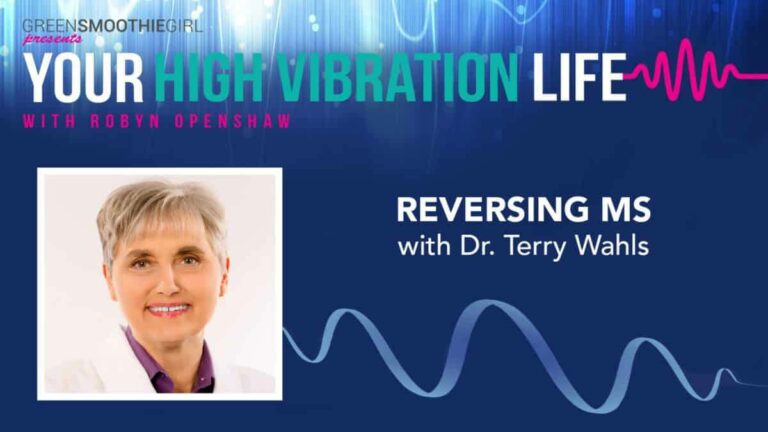Ep.35: Reversing Multiple Sclerosis Interview with Terry Wahls

Podcast: Play in new window
In this episode my guest Dr. Terry Wahls will discuss how she reversed her advanced Multiple Sclerosis using food and functional medicine. She’s a clinical professor of medicine at the University of Iowa, and she’s the author recently of “The Wahls Protocol: How I Beat Progressive MS Using Paleo Principles And Functional Medicine,” as well as a cookbook that goes with it. I hope you enjoy her inspirational story.
LINKS AND RESOURCES
Get Dr. Terry’s book The Wahls Protocol HERE!
Learn more about Dr. Terry Wahls: http://terrywahls.com/
TRANSCRIPTION
Robyn Openshaw: Hi there! It’s Robyn Openshaw and welcome back to Your High Vibration Life. I’m going to introduce you today to someone I have admired from a distance. We met just recently, but her name is Dr. Terry Wahls. She has become really famous for reversing neurological disease, very specifically her own, multiple sclerosis. She’s a clinical professor of medicine at the University of Iowa, and she’s the author recently of “The Wahls Protocol: How I Beat Progressive MS Using Paleo Principles And Function Medicine,” as well as a cookbook that goes with it. She is really inspirational because she was in a reclining wheelchair. I want you to meet her and I want you to learn from her. Thank you so much for being with us Dr. Terry Wahls.
Terry Wahls: Hey thank you so very much for having me today.
Robyn Openshaw: My pleasure, so tell me about being a medical doctor, declining, and being diagnosed with multiple sclerosis, and what was that like in the beginning?
Terry Wahls: Well, like many physicians, when I was first diagnosed, I started reading scientific literature about my disease and quickly it was just very, very upsetting because I saw that it was a progressive disease. Within 10 years of diagnosis one half of those newly diagnosed with relapsing, remitting multiple sclerosis, which I was, half will be unable to work due to severe fatigue, and one third will have some sort of gate disability, needing a cane, walker, or wheelchair. I kept getting more and more upset, and finally my spouse said, “Terry you’ve got to stop reading this stuff. It’s just getting you upset. Let’s go find the best people in the country and let them take care of you.” I went to the Cleveland Clinic and saw their best people and gave them all the control over my illness.
Robyn Openshaw: As a medical doctor, did you really put a lot of faith in the protocols of modern medicine and how long did that take you?
Terry Wahls: Well, at that time that I was diagnosed, I’m an academic internal medicine doc. I believe completely in the newest drugs, the newest devices, the newest surgeries. I think people who are using vitamins and supplements and complementary alternative medicine, and I know that people are spending billions of dollars, so I think it’s a tremendous waste of money for these unproven things. Naturally I thought I should treat my disease aggressively and sought out the best people that I could find in the country doing clinical research in my area, and that was the Cleveland Clinic.
I’m sort of fond now of saying, “God works in mysterious ways,” so by my getting MS and seeing that within three years my newest, latest drugs had not stopped my decline at all, and I was likely headed towards becoming bedridden and demented by my illness. I went back to reading the basic science. At first, I’m reading about little mice and little rat studies, and at that very first, Robyn, I’m searching for the newest, latest drugs. Fortunately after a year or two of doing that, I realized, “That was silly. I should be looking for things that I could access,” which were the vitamins and supplements.
Yeah, and so that’s when I began reading. At first, there really wasn’t anything in the MS literature about that but I did find literature with other mouse models of shrinking brains, things like Parkinson’s, Alzheimer’s, dementia, Huntington’s Disease, Lou Gehrig’s Disease and ALS. In all those things I saw that mitochondria were strained and they were giving signals “time to die” too early to the brain cells, and so I thought, “Well maybe that’s what’s going on with MS.”
Robyn Openshaw: Tell me about your turning point. You were totally pro-drugs and surgery. I’m curious if they put you on … it seems to me like they put people on Methotrexate with MS about that time, or where were you in that?
Terry Wahls: There’s the initial drugs, the Betaseron and Copaxone drugs. I tried those. It didn’t help. I continued to decline. Then when I needed the recline wheelchair I was put on Mitoxantrone which is a form of chemotherapy. Then the next thing, so I bypassed Methotrexate and I went straight to the chemotherapy. Then the next thing that became available was Tysabri which is that new biologic drug, very potent and very powerful. It was twice as effective at stopping acute relapses as all the other drugs but I continued to decline. I was taken off that then I was put on [Selsap 00:05:12], another form of immune suppression and that was the drug that I stayed on. Despite, I’m taking these drugs. They all make you sick.
They are all very very difficult to take but we’re terrified, most folks with MS and I was certainly one of them, terrified of becoming bedridden and demented from our illness so we take these drugs that make us sick because we think they are decreasing the likelihood that we’ll become bedridden and demented. In my case I could probably say, well that’s probably going to happen despite taking those drugs but maybe the drugs are slowing it down somehow. I stayed with the drugs for awhile and eventually of course I wise up and I do create an alternative approach.
Robyn Openshaw: Okay. Tell me about your turning point. You were really putting all your faith in the Cleveland clinic and they delivered you more and more toxic drugs, all of which were really difficult in their side effects. Then what?
Terry Wahls: Well you know the clinic did do one thing that was helpful for me. They told me about Direct MS Charity, a group out of Canada who’s son had dramatically restored his health using a gluten free diet. I, once there, got introduce to their work and the work of Lauren Credane, read that. Made some initial dietary changes that still didn’t change anything but at least I felt like I was doing something. I continued down the chemotherapy route, getting worse, down the Tysabri route, getting worse. Then I’d take Selsap and I’d begin reading and begin thinking about vitamins and supplements. I start on the vitamins and supplements. About six months later I am so disgusted. I haven’t gotten any better. My head that thinks vitamins and supplements are a terrible waste and I quit them because I’m mad and I’m cranky because I’m still getting worse but I can’t get out of bed the next day and I can’t go to work the next day. On the third day my wife Jackie comes in and says, Terry I think you ought to take these again. So I take them and I can get up the next day and go back to work.
I’m real excited like, wow that was a very interesting observation. Two weeks later I do the same thing again and I stop all my vitamin supplements, cannot function, three days later I resume them and I can function again. I decide that though they aren’t curing me, they clearly are doing something and my conclusion is they are slowing down the speed of my decline. It’s certainly helping my fatigue. Now I’m very excited because I’m figuring something out that my physicians were not telling me. Neither my neurologist nor my primary care doctor. Now I’m pretty excited about trying to read a little bit every week about mouse models of MS and other shrinking brains and beginning to be much more intentional about experimenting on myself.
Robyn Openshaw: Okay, so you had a turning point in your recovery. Supplements taught you that at least nutrients had something to do if you’re not failing further. You really redesigned your diet and that was a huge turning point right?
Terry Wahls: Yeah. You know that was a huge huge turning point. Although Robyn I’m going to step back a little bit before I redesigned my diet again to comment on a turning point that one of my physician friends had me write a case for the medical students about their introduction to clinical medicine. I wrote about an MS case. I decided rather than give them a lecture on MS I gave the medical students a lecture on what it felt like for me to go through the evaluation, be diagnosed with MS, and then now with a progressive illness having to reimagine my life every year as I was getting steadily worse. That experience really helped me out because I now had a purpose that I was now teaching the medical students how to be better physicians so I had been trying to give back to my family but now I was giving back to society at large. In many ways I turn that as a really important moment because my life was more meaningful. Eventually I would eventually figure out a way to return and reverse my disease but having meaning in my life even though I could recover was also a very very important part of my recover story.
Robyn Openshaw: K so it’s never one thing right. People get well from a serious really well progressed disease like yours, everybody wants to know what did it and sort of that medical model is like well what thing did you do, what pill did you take? What treatment did you have? It seems to me like it’s never just one thing and it sounds to me like you’re saying that having purpose and something driving you and something that you’re excited about in your career and helping others was part of it.
Terry Wahls: Yeah I think that’s a very very important part and once again I’ve come to see that as a vital step. You want to certainly fix the nutrition. I’m sure we’ll get around to talking about that but having purpose and meaning is so important. One to be satisfied with your life and then two, to be willing to do the work of all the other things that we can do to improve our health and vitality.
Robyn Openshaw: I saw when I was researching your work that Viktor Frankl, Man’s Search For Meaning, is a big part of your turning point. Want to talk about that?
Terry Wahls: Yeah. You know as I was getting steadily worse and I’m trying to cope with all of this my, remember my children are really quite young. They were 8 and 5 when I was diagnosed and by the time I’m in the wheelchair they’re 11 and 8. They’re really still very very young and I’m trying to still go to work, the VA is helping me adjust to all of this. I am telling myself everyday the same thing that Viktor Frankl taught is, Between every event in your life and your response to that event there’s a space and in that space the choice you make defines your character. I was telling myself everyday that my kids are watching. They can either see me get up and go to work everyday no matter how difficult this gets and that I’m going to stay positive no matter how difficult this gets or they can see me give in to despair and give up when the going gets tough. I’d work out every day. I’d walk as long as I could walk. I put in a pool and I swam and then when I couldn’t swim anymore I just did my simple aquatic exercises.
I’m telling myself your children are watching. Are you going to inspire them to show them how to be resilient in midst of change or are you going to show them how to give in and give up?
Robyn Openshaw: That is so beautiful. Tell me how old your children are now and tell me how each of them you feel has been impacted by the fact that you did show up and you did fight through it?
Terry Wahls: My son is 25. He’s in Princeton working on a Masters in Public Policy. My daughter is 22. She just graduated with a bachelors of fine arts in studio art painting. You might have heard of my son. He was the young man who testified in front of the Iowa house judiciary committee when they were trying to have a hearing over same sex marriage and he had a testimony defending his two moms. That little talk went viral with like 20 million views. He was an eloquent speaker and certainly feels inspired to want to make change for issues that he feels passionate about. My daughter, I remember when she was probably 10 or 11 complaining bitterly that she had to do the laundry and knew that none of her friends knew anything about doing laundry, knew anything about laundry soap. That was just totally not fair. My response was you know you’re so right. This is completely not fair. It’s completely unreasonable that we’re asking you these things. I’m sure I understand why you are upset. It’s also completely unreasonable that I have MS, that it’s a struggle for me to stand and walk. There’s nothing I can do about that.
It’s not fair. It’s not reasonable but this is what we have to live with and you will have to do the laundry and I’ll keep working as long as I can and then my daughter goes, Mom I think you are glad you have MS so you can lecture me about doing work.
Robyn Openshaw: I love teenagers.
Terry Wahls: Yeah so Zeb is horrified that I still tell that story. I go, You know Zeb that is just the story of the age that you were and the beauty is that because we got to have those conversations you really were much more mature than most of your friends and most of friends in high school and that’s why you were more mature than many of the kids in college. You understood that life’s not fair and there’s nothing you can do about it other than just give in or get up and get on with life.
Robyn Openshaw: Really interesting take away for your daughter. I would have never guessed that and I’m actually as a mom really inspired in ways that I didn’t even expect to be in getting to chat with you today. I love the way you reacted to Viktor Frankl and you know his life coming out of a concentration camp and then him sharing that absolutely pivotal work, Man’s Search for Meaning, that’s changed millions of other lives. Because he survived and made meaning of it you’ve done the same and your children are now out there, early leaders in things that they’re passionate about. I want to talk about The Wahls Protocol. Do you talk about those kinds of things or is it mostly diet?
Terry Wahls: You know actually I talk about diet. I talk about finding meaning and purpose. Your mission statement, what you want your health for. I talk about the importance of detoxification pathways, about stress reduction, exercise movement, your social network. We talk about all of these lifestyle things but I do come back to that I think the bedrock, one of the most powerful things we can do is improve the quality of our diet. I provide a template for doing that and I do that for people who are vegetarian or vegan, people who are paleo or meat eaters and people are ketogenic eaters because too many of us, I include myself in all of this, we don’t know how to structure a diet effectively. I didn’t do it very well as a vegetarian and I didn’t do it very well as a paleo eater because I was still ill both ways but when I learned how to structure the diet for my mitochondria then my health recovered and so I created a way of doing that whether or not you’re an eating fat, eating meat, eating just plants because I think all three of those groups can inadvertently create health problems for themselves if they don’t have some better guidance.
Robyn Openshaw: Okay so tell us what you eat on a daily basis because you’ve been out of the wheelchair for how long?
Terry Wahls: Eight, nine years. Nine years already. Wow.
Robyn Openshaw: That’s so incredible. How many people once they’re in a wheelchair from MS and you were fairly young, how many people get out of the wheelchair?
Terry Wahls: You can occasionally get into the wheelchair during the relapse and remitting phase and get out of it but if you get into the wheelchair in the progressive phase no one gets out of it. If you look at the case reports, I’m the only case report of it ever reversing. We have published research in our clinical trials where we got several of our folks in the wheelchairs, our of wheelchairs as well so again when you hit the progressive phase according to our conventional understanding, you do not expect to get back out of the wheelchair.
Robyn Openshaw: Okay. I totally want to talk about the clinical trials in just a second because you are conducting clinical trials which I think is really exciting but tell me what you eat everyday?
Terry Wahls: This will vary according to season so right now I’ll give you the sort of winter version of my diet. Then I’ll move into the summer version of my diet so during the winter I’m much more interested in having some ketosis so in the morning I’ll just have water and I’ll take my usual vitamin cocktail. Then I’ll go off to work. Then I’ll come home in the evening and I’ll have what I call a membrane smoothie so it’s a lot of fat in that. It has some cocoa and cinnamon and some collagen in that. Then I’ll have a big green salad or I might have cooked greens. Then I’ll have a skillet in which I’ll have whatever. I might have ground beef or some elements of meat protein in there and tons and tons of vegetables. Yesterday I would have had some ground lamb and a bunch of chopped peppers and chopped onions and mushrooms. Then for my dessert I would have some chia pudding so coconut milk with some chia and then I’d have coconut milk and chamomile tea to top everything else.
How this changes during the summer –
Robyn Openshaw: Well hold on a second. In the winter, all winter do you eat only one meal and it’s a big meal?
Terry Wahls: Yeah. You know on the weekend with my family I may have, socially I might have breakfast or lunch but there’s a social event around it. During the winter I’ll generally have just one meal. Water during the day and a big meal in the evening. It’s almost like I’m eating a lot but of course that’s the only time that I’m eating. I do that because I’ll make more ketones during the day which is great fuel for my brain. It stimulates the number of mitochondria per cell and it stimulates the efficiency per cell. This is a great anti-aging strategy. It is a great strategy for repair of your brain cells but I’ll do that just during the winter. When spring comes around and we start having our salads come in and berries come in I’ll go back to having a green smoothie or a beet smoothie in the morning and then I will have, I’ll still just eat two meals a day but then I’ll have a salad or cooked greens, a big platter of vegetables, and probably some grilled or steamed meats or fish of some type.
Robyn Openshaw: Okay so I think that people will be interested to know this because not everybody is as dialed in and not everybody is eating for their neurological health. Tell me before you where diagnosed when you were very medically oriented and you hadn’t made a shift to thinking in more holistic ways or more like the functional medicine that you now are interested in and practice. Did you, before you made the shift did you have coffee, soda, flour, sugar, all the stuff?
Terry Wahls: I grew up on a farm and during my high school year I decided to become a vegetarian. Legumes, grains, some vegetables. I never liked coffee, liked tea. I would have white flour, pasta, I would have some sugar. Not a huge sugarholic but I certainly did indulge in some cakes and sweets, cookies. People would have thought this was a pretty healthful diet. As I had mentioned my Cleveland Clinic folks had suggested the work from Direct [inaudible 00:22:45], introduced me to Cordane and the paleo diet so I went back to eating meat but continued to decline so the paleo diet certainly did not recover me either but people would have thought that was a healthful diet but I didn’t really know how to maximize the vitamin/mineral anti oxidant intake and I wasn’t really zeroing in on what was the nutritional requirements of myself and of my mitochondria and of my brain cells. That was really the big aha moment when I said, you know that’s what I should really be doing is using my list of vitamins and supplements to say what do I need? What foods do I need to eat? What foods would maximize this intake?
That’s when I dramatically increased my vegetable intake. I was still eating meat but it was really a much smaller part of my diet but the vegetable intake was huge. I was having some berries. During the summer I still have lots of berries but I was probably having 12 to 15 cups of vegetables a day because once I did this I discovered that man I craved it in a big way. I structured this very specifically with greens, the sulfur rich category, and the deeply pigmented category.
Robyn Openshaw: 12 to 15 cups of vegetables. Often when I talk about drinking a quart of green smoothie a day which I’ve challenged people to do for many years and on a 450 city speaking tour I was on for 6 years. I tell you people would say, I would have diarrhea. I’ve had not just one quart but two quarts of green smoothie or green juice for years and years and years now and of course it’s just a matter of yeah you might have a reaction to it because your body is not used to so much vibrance, so much micro nutrition. It’s really interesting that you do that day in and day out. I think that blending, juicing, the stir frys that you make, the salads, those are probably the methods right? Got any other ideas on how to get 12 to 15 cups of vegetables in your day?
Terry Wahls: Well you know I should let everyone know I’m a big lady. I’m 6 foot tall and so I was doing salads. I was doing smoothies and I just incredibly craved this. When I dialed back my meat and there’s no grain, no processed foods, no sugars, you’re pretty hungry. I was eating all that stuff and if you’re eating green leaves a plate full of spinach or arugula if you cook it comes down to almost nothing so if you’re not eating much fruit, I think it’s pretty easy to get past 9 cups of vegetables. 12 to 15 was really very easy. Now 9 years into this I’m probably not doing 12 to 15 cups anymore. I’d say 9 cups is probably much more accurate. When I talk about this in the public I knew full well that the public could just not get their head around 12 to 15 so I moderated my message to 9.
Robyn Openshaw: You know because you do deal with those in a teaching setting and probably at some level previously a clinical setting, the USRDA, the government has admitted that the reason they don’t raise the number of fruits and vegetables that you should eat in a day above five is because people can’t handle it. That’s the only reason. The only reason is that –
Terry Wahls: It’s just so silly.
Robyn Openshaw: I’m excited really to hear a little bit about your clinical trials that you’re doing right now with other folks with neurological degenerative disease.
Terry Wahls: Yeah, so we had our first pilot study which is where we basically copy what I did in a very specific regimented way so we could replicate this. We were able to show that people could implement it. It was safe. The biggest problem was that if you were overweight you lost weight and got back to a healthy body weight. We had a fairly clinically significant reduction in the fatigue and an improvement in overall quality of life. We have, so we’ve got several papers out for that. We had a subsequent study where we randomized people to either wait or to get trained on the diet immediately. These were folks with relapse remitting MS and we were able to show that there is again a reduction in fatigue, improvement in quality of life, and in this study we showed improvement in motor function in terms of hand function and in terms of walking.
The next papers that we have coming out went back to our very first study because we had so much data that we are finally now able to analyze once we had additional funding come in. There will be a paper coming out in this months General American College of Nutrition that talks about the favorable changes in mood and cognition that we’re able to show. We have another paper that we are in the process of revising and resubmitting so hopefully we’ll get that approved soon. That paper describe the changes in gate that we saw in the people who again had progressive MS that you expect to only go downhill and there we’re trying to get that paper into an Open Access paper. Assuming that we do ultimately get published those videos then would be findable in the public domain which would be very exciting because I would like the public to be able to see some of these wonderful changes that we are able to show pre and post.
We have the current study, which was funded by the National Multiple Sclerosis Society where we are observing people for 12 weeks and then randomizing them to either the low saturated fat diet, or the swank diet, or the modified paleo diet which we’re calling the Wahl’s diet. Then we’ll follow people for 12 weeks and see how they do. You know because the swank has been helpful and the Wahl’s diet has been helpful we’re comparing both groups to their observation period. We’ll have a way to see is one diet better than the other? Are both diets beneficial for treating fatigue and improving quality of life?
Robyn Openshaw: So if you feel confused as you’re listening to us about what diet should I follow you may know that for healthy people I don’t think we need to follow a diet as much as we need to eat whole foods. I think the thing that all these diets have in common, and any protocol to eat healthy for a regular healthy person is going to be to eat lots of whole foods and Dr. Wahl’s has certainly learned this. Tell a little bit Terry about your opinion on supplements versus food and what difference they made.
Terry Wahls: You know I think we can just look at my food journey so my vegetarian diet as I interpreted it did not lead to good health, my paleo diet as I interpreted it did not lead to good health. When I added vitamins and supplements I continued to decline although I did figure out that the vitamins and supplements slowed my decline so that was really something I was profoundly grateful for. When I redesigned my version of the paleo diet to maximize those nutrients that I was taking in pill form, that’s when the magic began. Now I still use targeted vitamins and supplements because remember I had a very severe disability from my MS but the magic began with the 12 to 15 cups of vegetables in a very structured way, in a very structured paleo diet. In a years time I went from being unable to sit up to being able to do an 18 mile bike ride with my family, to having no fatigue, having my pain controlled for the first time in 20 years and having my brain fog gone. It was the food that made the big difference. Yes I still need the targeted supplements and they’re very helpful but the magic was adding all of that very structured food in a very clear way that I designed for my mitochondria.
Robyn Openshaw: Your diet is specific to healing mitochondria, healing that mile and sheath and you know I’m not a doctor but being on that lecture tour that I mentioned where people stood after my lectures in 450 cities for many years and they wanted to talk to me about their diagnosis. They always want to tell me their diagnosis and then say does this work for that? By this they mean getting more vegetables and greens and whole foods into their diet and I always want to be very careful because I don’t want to diagnose, treat, or prescribe. Way outside my scope. Don’t want to be prescriptive in talking about diet. I just want to talk about what happened for me and my family when we went from being sick and fat on the standard American diet to healthy and well and competitive athletes on a whole foods diet, regardless of how you want to slice it or which dietary protocol you want to put it under.
I would always say to people, I’ve got to be very careful answering that question because I can’t say that doing x is going to have outcome y and I can’t say that eating this specific way is going to heal this disease, however we didn’t have degenerative disease. We didn’t have cancer. A person could spend an entire lifetime and never meet another person with cancer because it was one in 200. We didn’t have heart disease before we had the Standard American Diet so it has to be part of the solution. That’s my safe answer. I hear you saying the same thing in that you take supplements. Supplements are more expensive than food and food always has to be a part of the solution. Do you agree with that?
Terry Wahls: Food has to be part of the solution. I think when I think of what were the mechanisms by which my recovery happened if I look at just the food part of it. At first I though I designed this diet very specifically around micronutrients in that it was Bruce Aimes theory that if you don’t have enough micronutrients your body sort of triages the most acute lifesaving needs to clot your blood so you don’t bleed to death but you don’t take care of your longterm health for example. That’s what I was doing. Then as we began to understand upper genetics that the food that we eat speaks to our genes turning genes on and off and we can create what should have been a healthy disease resistant body into a sickly disease prone one by eating sugar and white flour or we can create the disease resistant body that our DNA wants to build by eating lots of vegetables so I thought okay, the vegetables were really shifting gene expression through that term called epigenetics. Now more recently we know about how important our poop is, that the bacteria and the yeast living in our bowels that make up our poop, that they help our bodies run the chemistry of life and that they make little byproducts that get into our bloodstream that help our brain work better that all those vegetables were fertilizing to help promote bacteria.
Of course the reality is it was all three of those things, the micronutrients according to what Bruce Aimes would have said, epigenetics according to what Randy Hurdle observed and the microbiome shifts.
Robyn Openshaw: Okay let’s go sideways for a quick second about the microbiome. What do you think is key in rebuilding your microbiome and also what do you think of your colleagues in the field of medicine, the way they use antibiotics these days.
Terry Wahls: Well we’ll talk first about the antibiotics. We brought, when we first started having an elementary tract, that is a gut, long ago when that was in the evolution of life we brought with us at that time the bacteria in those ancient ancient seas and we have had this mix of bacteria that helps us digest our food and run the chemistry of life over those thousands and millions of generations that we have been a species and have existed with our guts. Every time we take antibiotics we kill off some of those species and we decrease the diversity of bacteria living in our bowels which means we can’t do the chemistry of life as fully and as completely. The consequence is higher rates of autoimmune problems. Every time you take that round of antibiotics higher rates of obesity, diabetes, heart disease, heart rates, neurological problems, dementia kind of health problems. That is huge. The antibiotics decrease the diversity. Sugar and white flour decrease the diversity.
What increases the diversity because I want to have as many different species in my bowels as possible so I can run the chemistry of life more effectively. Lots of vegetables increase that diversity. Eating more fermented foods, sour krout, kimchi, fermented beets, beet cava, kombucha, all of that helps increase that diversity. Eat enough fiber. I’m pooping snakes instead of pebbles or rocks.
Robyn Openshaw: I love it and thank you for talking boldly about that. We talk around it for some reason in our culture. We talk around it and we don’t want to talk directly about what good digestion looks like.
Terry Wahls: What your poop looks like?
Robyn Openshaw: The next thing we need to do is start teaching that in second grade.
Terry Wahls: Absolutely.
Robyn Openshaw: All right well thank you so much for all this incredible information. If you want more information from Dr. Terry Wahls, her book The Wahls Protocol: How I Beat Progressive MS using Paleo Principals and Functional Medicine, we’ll put a link to that in the show notes. Thank you so much for being with us Dr. Terry Wahl.
Terry Wahls: Thank you.














No comments found, but you can be our first!